Front Cover
TAC Table of Contents
Contact Information
|
The Adventures Continue (TAC) is a website devoted to George Reeves and the Adventures of Superman. All contents copyright© by Jim Nolt unless otherwise noted. All rights reserved. Nothing from this website may be reproduced by any means, in whole or in part (except for brief passaged used solely for review purposes) without the written permission of either Jim Nolt (owner) and/or Lou Koza (editor) and/or Greg McCollum (writer). The contents of the feature, including the images denoted as such are copyrighted and owned by Greg McCollum. All rights reserved. Superman and all related indicia are trademarks of DC Comics, Inc. and are reproduced for historical purposes only. Use of the name of any product or character without mention of trademark status should not be construed as a challenge to such status. |

|
Greg McCollum is the author of George Reeves: The Real Man of Steel, an article originally published in The Atlanta Constitution in 1978. Re-presented here. Here he recalls the places he went and the people he interviewed in 1976 and 1977.
My 1970's Search for George Reeves It's late August 1959, the first day of school in my part of Georgia. One of my new friends tells me that Superman shot himself. I'm confused. Superman is a character on my favorite TV show. I watch him every weekday via an Atlanta TV station. He's my idol. I eat corn flakes because of him. He could not have shot himself. My friend tells me he did, too, and if I don't believe it, just ask Mrs. Jones. Mrs. Jones tells me to ask my mother. On the way home on the bus, I cry and embarrass my older sister. It's January 1976 and I'm working in my first real job after college as a news cameraman for a Chattanooga TV station. To take the sting out of the lousy pay, I've been given the title of "chief cinematographer." I work with one of three full-time reporters covering local news. During bad storms, I get wet filming the inevitable car wreck. The reporters interview politicians, cops, and crooks. I figure I can do that. The old Five W's and one H. Just the facts, ma'am, like Sergeant Joe Friday but with longer hair. It's Spring of 1976 and while love and pollen are in the air, I'm thinking about my old hero, George Reeves. Did he really shoot himself and, if so, why? Every red-blooded kid in America loved him. Wasn't that enough? I'm at the library, running rolls of microfilm through a viewer. The New York Times. The Los Angeles Times. Page after page rolls by, but the pictures are unclear. Everything is in reverse negative. Still, it's enough to give me the contemporary account of June 16, 1959. I spend the next few evenings sitting in the library going through all the microfilm available. Now my curiosity is piqued. What really happened to George Reeves? I'm going to find out. Let's pause for a paragraph so you'll understand the difficulties ahead of me. First, there is no internet in 1976. I can't "google" George Reeves or anyone he ever knew. Second, long distance telephone calls are expensive. You're charged by the minute and distance. This assumes that you've found a number you can call. Third, I'm geographically in the wrong place, living in Chattanooga, Tennessee. Los Angeles is over 2,000 miles distance. Fourth, I have no legitimacy as a reporter, no curriculum vitae, no city desk, no Perry White. Fifth, I have no money. I'm a local TV news cameraman. That's entry level. Last, I'm no Mike Wallace when it comes to approaching potential interviewees. There is only one thing I have, one quality that will spur me on and propel me to reach for the stars. No, it's not determination or intellect, but a healthy dose of good old-fashioned naiveté. At a bookstore, I see Superman: Cereal To Serial by Gary Grossman. My heart sinks. Great Caesar's Ghost! I've been scooped! I buy it and take it home. Soon I realize the book is mainly about the TV show and not George Reeves. I push onward. |
|
It's July 1976 and I'm driving my Olds Cutlass up Interstate 55 en route to Galesburg, Illinois, home of the late Helen Bessolo, mother of George Reeves. My contact is Alma Archer Fox, Helen's cousin and a local newspaper columnist. Since cell phones don't exist, I pull into a gas station and
use a pay phone to call Alma and let her know I've arrived in
town. She insists I stay at her place so I drive over and meet
her. She looks to be in her mid-seventies with a cheerful smile
and a vivacious personality. She says I can use the spare bedroom.
I walk with her into the house and meet her three Dalmatians.
My nose tells me these dogs stay inside. I notice dog hair everywhere.
I try to think of an excuse to stay elsewhere. I start slyly
breathing through my mouth. Alma refuses to hear talk of staying
anywhere else. How's a young man going to get anywhere in life
throwing good money away on some ritzy hotel? A lifetime of respecting
my elders kicks in and I say no more about leaving. |
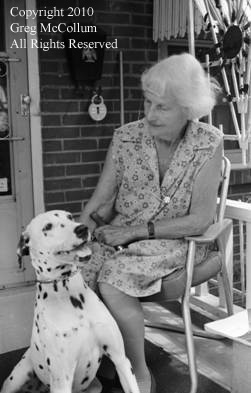 |
|
The next day we drive around Galesburg, a lovely, small Midwestern city with beautiful old architecture. Alma talks about Helen Lescher Brewer Bessolo, mother of George Reeves. She shows me the cemetery where Helen's parents and sisters are buried, the downtown Galesburg store once known as Lescher Drug Company, and introduces me to Barney McKay, a source later featured in my newspaper article. 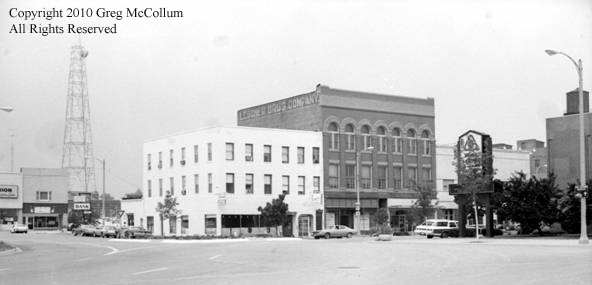 As we're riding along, Alma drops a bombshell. She claims she witnessed the "conception of Superman." According to Alma, as a teenager she was asked to help supervise a church picnic for the youngsters. Helen Lescher and her boyfriend, Don Brewer, were also there to chaperone. While all the kids were playing down by the lake, Alma decided to walk back into the woods to the picnic tables. There she found Helen and Don in a moment of passion. Not wishing to interrupt, she sneaks away unseen. |
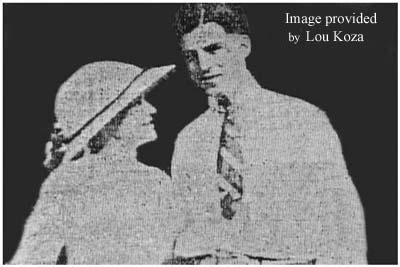
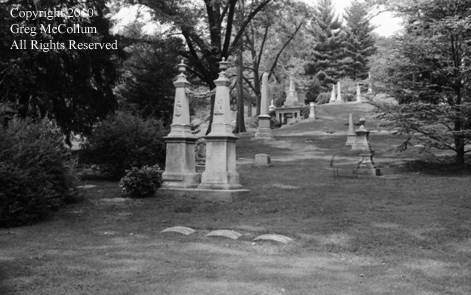 |
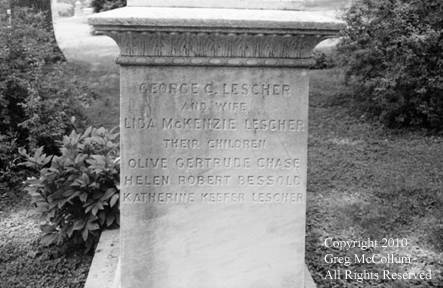 |
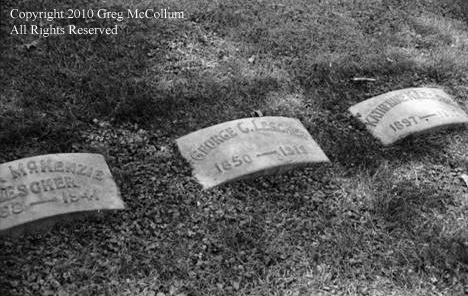 Another day is spent interviewing the few locals who remembered Helen. The next day I drive back to Chattanooga. It's January 1977. I'm driving to California and make the trip from Chattanooga in three days, saving me an extra night of motel living. I crash on the couch of a college friend living in El Segundo. The next day I find a furnished apartment to rent across Inglewood Avenue from Hawthorne High School. My initial observation is that Hawthorne looks nothing like a Beach Boys song. I spend the next few days making phone calls and lining up interviews. I find Whitney Ellsworth, the producer of the Adventures of Superman in the telephone directory and give him a call. He initially passes on an interview, but suggests I write a letter outlining my efforts so far. He gets the letter and calls back to say that I'm obviously a serious person so he'll see me. I visit with relatives of George who live in Glendale, an older couple named Shelton. They're nice folks and provide me with a few more family details. They also tell me to contact Catherine Chase in Whittier. I'm driving north on the San Diego Freeway, trying to avoid all the speeding cars. Evidently, you are supposed to add about thirty miles to the posted speed limits. There is a white Pontiac Firebird on my tail as I take an exit ramp. The driver is using a microphone to address me from speakers which must be mounted somewhere under the car's hood. No doubt he is complimenting me for my safe driving skills, but since I don't understand his language, I cannot be certain. I take the Ventura Freeway to Thousand Oaks and arrive at the home of Whitney Ellsworth. I'm greeted at the door of his ranch-style house by his lovely wife, Jane. Her smile immediately puts me at ease as she escorts me inside to meet Mr. Ellsworth. He is sitting on the couch. Next to him is an oxygen tank. Whitney has emphysema, but his handshake is strong as he stands to greet me. On the couch is a copy of Gary Grossman's book, Superman: Cereal To Serial. Before I can say how much I enjoyed that book, Whitney opens it and complains that, despite his cooperation, Grossman made too many errors. After a bit of venting on that subject, he loosens up and allows me to audiotape the interview. Editor's Note: It is common knowledge, even to Gary Grossman that Whit's copy of Serial to Cereal highlighted those items he felt were incorrect. The book remains a huge favorite among the show's fan base. Whitney shows me a screenplay he's written based on a novel
by Conrad Richter. He hopes to produce a film version. He also
advises me to keep a daily journal. I promise to do so, but after
a couple of months, I quit. 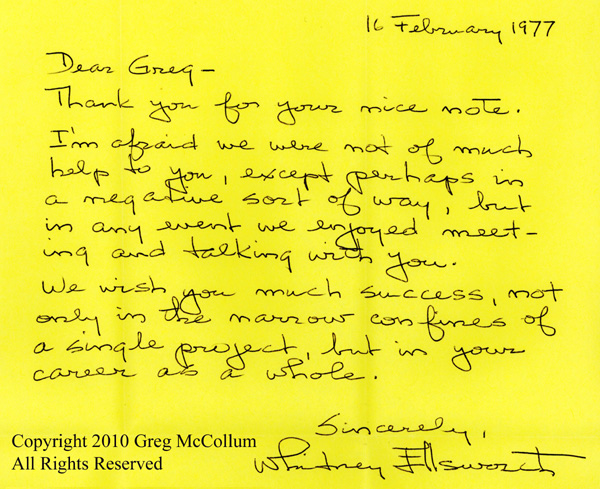 A few days later. It was a dark and stormy night… no, really… and I'm driving to downtown LA to the Olympic Auditorium to meet Gene LeBell, George's friend and wrestling partner. As I get closer, I can't tell if I'm on the "good" side of town or not. I find a parking spot near the Auditorium, tell the box office attendant my name, and she lets me inside. There are a few hundred people watching a wrestling match. Gene is inside the ring, wearing a tuxedo and announcing between matches. I notice someone wearing a gorilla mask. He walks up behind people and taps them on the shoulder. When they turn around, he growls and scares them. This activity does not appear to be an official part of the night's entertainment. Once the wrestling matches are over and people are filing
out, I sit down in a row of seats with Gene and he tells me about
George. He tells me several risqué stories which I can't
repeat here. (No, really, I can't. However, one did appear in
my finished article, but attributed only to "a friend.")
Bottom line for Gene is that George was a good person who was
making plans for personal appearances and additional acting jobs.
Gene doesn't understand why George would commit suicide. Editor's note: It is Gene, aka "a friend," who in Greg's 1978 article doesn't mention by name Leonore Lemmon and Gwen Dailey as the two naked woman who greeted him a George's front door. Gene however more recently did tell the full story to Speeding Bullet and in his own book, Gene LeBell: The GODFATHER of GRAPPLING.. It's a sunny January day in Whittier as I park my car and walk up the sidewalk to meet Catherine Chase, George's cousin. Her pleasant demeanor puts me at ease as she tells me about George. At the time, 1959 seemed like ancient history, but it was only seventeen years earlier and it must have saddened her to review the details of George's tragic death. Catherine shows me a copy of a report made by a private detective hired by Helen to find out what really happened to George. In the margins Helen has written in her distinctive handwriting the letters "N.G." which stand for "no good." From the numerous "N.G.s" it appears that Helen didn't get her money's worth from the private detective. I also review the report from a second autopsy of George performed weeks after his death, initiated by Helen in an attempt to prove her son never committed suicide. I ask Catherine if she knows anything about George's former wife, Ellanora Needles. She remembers Ellanora married a Beverly Hills attorney, but can't remember her married name. She rifles through more paperwork and finds it: Rose. The next day, I call the two attorneys in Beverly Hills with
the last name of Rose. The second one tells me that his wife
was once married to George. He takes my name and number and suggests
that his wife will call if she's interested. That evening, I
get a phone call from Ellanora. She's easy to talk to and seems
genuinely interested in my project. At the end of our conversation,
she asks that I not reveal her married name. Note: several writers
since have identified her.  I keep working the phone and writing letters: * I speak to Robert Justman who, after the Adventures of
Superman, became a co-producer of the original Star Trek
TV series. Editor's Note: In Speeding Bullet by Jan Alan Henderson, it is mentioned in the 70's Toni was angry that a reporter was asking questions in LA about George and was wanting to reach her. She called Howard Strickling of MGM Studios to put an end to this. Greg went out to California in January of '77. The timing seems right. Could Greg be that reporter? According to Speeding Bullet, Mr. Strickling did not act on Toni's insistance and Greg McCollum was never aware of this. A few days later, I pack up my typewriter and drove back east. I've spent all my money, I've run out of sources, and I miss my girlfriend. Once home, I spend hours reviewing my notes and interview recordings. I write an article about George, but have difficulty selling it to a national magazine. It finally appears in The Atlanta Constitution in anticipation of the first Christopher Reeve Superman movie with the title George Reeves: (The) Real Man of Steel. Over the next few years, I forget about my adventures in Illinois and California. Perhaps no one cares about the Adventures of Superman or George Reeves, an actor who meant so much to me as a little kid. But then a strange thing happens. The internet bursts onto the scene and I quickly realize that George Reeves has a huge fan base, one much larger than when he was living. And it's not just us baby boomers. Folks of all ages love and admire George for his charming portrayal and sincerity, and his personification of truth, justice and the American Way. Looking back to the 1970s and remembering the patient people I spoke to about George, I found nothing that diminished my impression of George Reeves as a gentleman and true friend to so many.
I should have written a story about Alma Archer Fox. In the 1920's, she designed cars for Don Lee, a Los Angeles Cadillac dealer and early customizer before moving to San Francisco and, later, New York. Her 1988 obituary in the Los Angeles Times states that she "moved to New York in 1924 where she ran a charm school on Fifth Avenue and became a columnist. Highlights of her career included interviewing Adolf Hitler, drinking with Ernest Hemingway in Paris, and sailing south of France with James Joyce. Her column on fashion and style was once carried by more than 1,100 newspapers." Alma's charm school, Alma Archer's House of Smartness, was featured in a 1937 edition of the New Yorker magazine. She also told me she once dated Richard Helms, later CIA director under Presidents Johnson and Nixon. I recently reviewed some of Alma's letters while writing this article. Here are some excerpts: Alma Archer Fox: Ordained minister William P. Drew was a professor at Knox College and married Don and Helen. Alma Archer Fox: I was fond of Gertrude Lescher, the one who had a nervous breakdown, and I presume was mother perhaps of Charles. And it was Keefer who prayed to God for recovery of Gertrude, promising to cut off her hair if He would cure her. Keefer kept her word and cut off the beautiful brown curls." Note: Helen had two sisters, Gertrude and Keefer. George's middle name was also Keefer. Death: July 19, 1916, Galesburg, Knox County, Illinois, USA
Alma Archer Fox: My father always referred to his dad as "an itinerant preacher in the Millersburg, PA area," and the reason they all became Presbyterians when they came to Galesburg was because it was closest to the Dutch Reform Church where they belonged in Pa. They arrived in PA after emigrating from Alsace-Lorraine. Note: Alma's father was Helen's uncle, making them first cousins. She is referring to their grandfather Lescher. Alma Archer Fox: Mr. Jess Arie of Galesburg told me this morning that his brother is Arthur W. Arie, living now in Ft. Madison, Iowa. It is his wife, I believe, who accompanied Helen Bessolo to California." Note: I believe this refers to Helen's trip to California after George's death. |

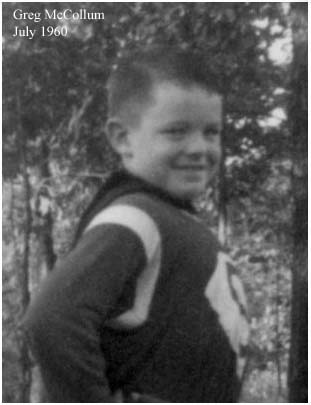 |
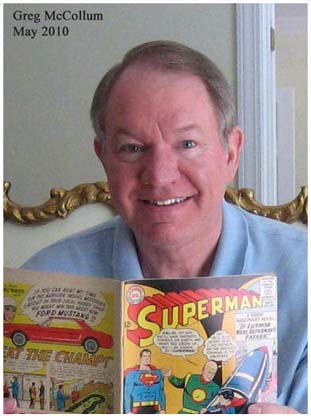 |
| I hope you found this story behind the story interesting. The Adventures Continue would like to thank Greg McCollum for the time he took to follow-up with his experience from so many years ago. I want to remind the readership that at this time, Greg was just 23 years-old when he embarked on this trip to both Galesburg, Illinios and then Los Angeles, California.to gather the information for George Reeves: The Real Man of Steel. |
Greg is hoping to revisit Galesburg sometime during a summer vacation in the area and should he have anything new to report you can be sure to find it here at The Adventures Continue.
Until then....... |

|
|
|
The Adventures Continue (TAC) is a website devoted to George Reeves and the Adventures of Superman. All contents copyright© by Jim Nolt unless otherwise noted. All rights reserved. Nothing from this website may be reproduced by any means, in whole or in part (except for brief passaged used solely for review purposes) without the written permission of either Jim Nolt (owner) and/or Lou Koza (editor) and/or Greg McCollum (writer). The contents of the feature, including the images denoted as such are copyrighted and owned by Greg McCollum. All rights reserved. Superman and all related indicia are trademarks of DC Comics, Inc. and are reproduced for historical purposes only. Use of the name of any product or character without mention of trademark status should not be construed as a challenge to such status. |